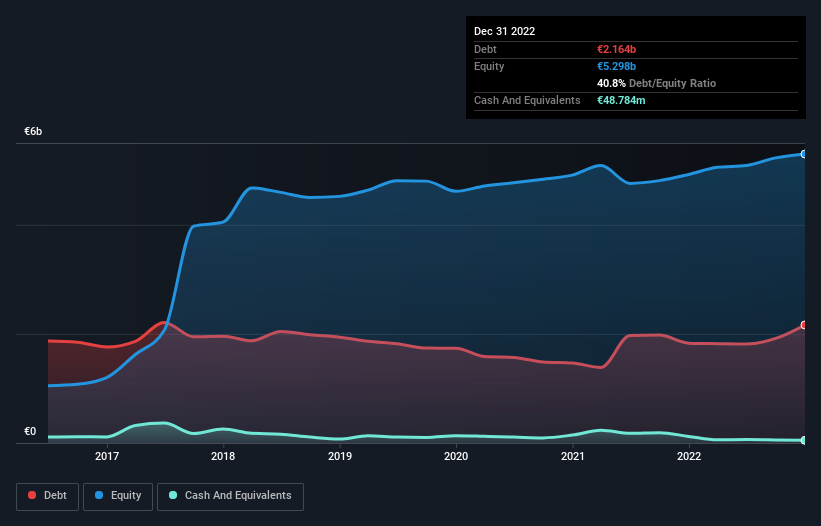David Iben put it well when he said, 'Volatility is not a risk we care about. What we care about is avoiding the permanent loss of capital.' So it might be obvious that you need to consider debt, when you think about how risky any given stock is, because too much debt can sink a company. We note that United Internet AG (ETR:UTDI) does have debt on its balance sheet. But the more important question is: how much risk is that debt creating?
When Is Debt A Problem?
Generally speaking, debt only becomes a real problem when a company can't easily pay it off, either by raising capital or with its own cash flow. If things get really bad, the lenders can take control of the business. While that is not too common, we often do see indebted companies permanently diluting shareholders because lenders force them to raise capital at a distressed price. Having said that, the most common situation is where a company manages its debt reasonably well - and to its own advantage. When we examine debt levels, we first consider both cash and debt levels, together.
See our latest analysis for United Internet
What Is United Internet's Net Debt?
You can click the graphic below for the historical numbers, but it shows that as of December 2022 United Internet had €2.16b of debt, an increase on €1.83b, over one year. On the flip side, it has €48.8m in cash leading to net debt of about €2.11b.

How Healthy Is United Internet's Balance Sheet?
Zooming in on the latest balance sheet data, we can see that United Internet had liabilities of €1.84b due within 12 months and liabilities of €3.22b due beyond that. Offsetting these obligations, it had cash of €48.8m as well as receivables valued at €1.14b due within 12 months. So it has liabilities totalling €3.87b more than its cash and near-term receivables, combined.
Given this deficit is actually higher than the company's market capitalization of €2.75b, we think shareholders really should watch United Internet's debt levels, like a parent watching their child ride a bike for the first time. Hypothetically, extremely heavy dilution would be required if the company were forced to pay down its liabilities by raising capital at the current share price.
In order to size up a company's debt relative to its earnings, we calculate its net debt divided by its earnings before interest, tax, depreciation, and amortization (EBITDA) and its earnings before interest and tax (EBIT) divided by its interest expense (its interest cover). This way, we consider both the absolute quantum of the debt, as well as the interest rates paid on it.
United Internet's net debt to EBITDA ratio of about 1.9 suggests only moderate use of debt. And its strong interest cover of 25.9 times, makes us even more comfortable. Importantly United Internet's EBIT was essentially flat over the last twelve months. Ideally it can diminish its debt load by kick-starting earnings growth. When analysing debt levels, the balance sheet is the obvious place to start. But it is future earnings, more than anything, that will determine United Internet's ability to maintain a healthy balance sheet going forward. So if you want to see what the professionals think, you might find this free report on analyst profit forecasts to be interesting.
Finally, a company can only pay off debt with cold hard cash, not accounting profits. So we clearly need to look at whether that EBIT is leading to corresponding free cash flow. Looking at the most recent three years, United Internet recorded free cash flow of 44% of its EBIT, which is weaker than we'd expect. That's not great, when it comes to paying down debt.
Our View
We'd go so far as to say United Internet's level of total liabilities was disappointing. But on the bright side, its interest cover is a good sign, and makes us more optimistic. Once we consider all the factors above, together, it seems to us that United Internet's debt is making it a bit risky. That's not necessarily a bad thing, but we'd generally feel more comfortable with less leverage. The balance sheet is clearly the area to focus on when you are analysing debt. However, not all investment risk resides within the balance sheet - far from it. For instance, we've identified 1 warning sign for United Internet that you should be aware of.
If you're interested in investing in businesses that can grow profits without the burden of debt, then check out this free list of growing businesses that have net cash on the balance sheet.
New: AI Stock Screener & Alerts
Our new AI Stock Screener scans the market every day to uncover opportunities.
• Dividend Powerhouses (3%+ Yield)
• Undervalued Small Caps with Insider Buying
• High growth Tech and AI Companies
Or build your own from over 50 metrics.
Have feedback on this article? Concerned about the content? Get in touch with us directly. Alternatively, email editorial-team (at) simplywallst.com.
This article by Simply Wall St is general in nature. We provide commentary based on historical data and analyst forecasts only using an unbiased methodology and our articles are not intended to be financial advice. It does not constitute a recommendation to buy or sell any stock, and does not take account of your objectives, or your financial situation. We aim to bring you long-term focused analysis driven by fundamental data. Note that our analysis may not factor in the latest price-sensitive company announcements or qualitative material. Simply Wall St has no position in any stocks mentioned.
About XTRA:UTDI
United Internet
Through its subsidiaries, operates as an Internet service provider worldwide.
Moderate growth potential second-rate dividend payer.
Similar Companies
Market Insights
Community Narratives




